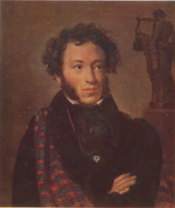
The Presidential Library’s collections spotlight Alexander Pushkin: “he immediately caught the very principle and charm of reality”
June 6, 2019 marks the 220th anniversary of the birth of Alexander Pushkin, the great poet, thinker, publicist, creator of the modern Russian literary language. The Presidential Library’s portal features electronic collection “Alexander Pushkin (1799–1837)”, which includes digital copies of books, articles, archive documents, dissertation abstracts, video films, graphic and other materials devoted to the life and work of the poet and the activities of the state in preserving his memory. By the anniversary, the number of items has exceeded 400.
Two basic publications formed the collection give a complete picture of the poet’s works and personality - these are the books by academician Yakov Grot “Pushkin, his Lyceum comrades and mentors” (1887) and V. Veresayev “Pushkin in life” (1928).
The circumstances of the writer's childhood are extremely important: the atmosphere of the house, the demands of the parents, the surrounding nature. According to unique books of the Presidential Library, Pushkin’s childhood was overshadowed by complicated relations with his mother.
His uncle Vasily Lvovich was interested in Pushkin’s abilities and humanitarian inclinations. In 1811, he drove a 12-year-old Pushkin from Moscow to the Tsarskoye Selo Lyceum, where talented youngsters were trained for public service. The Presidential Library’s portal features a digitized copy of the draft Statute of this educational institution. Here is also presented a copy of the “Diploma granted to the Imperial Tsarskoye Selo Lyceum by Emperor Alexander I”.
During the Lyceum years, Pushkin has teaming activity on publishing handwritten magazines with his comrades, he comes into contact with literary publications of that time, printed his poems and even received royalties. After graduating from the Lyceum in June 1817, Pushkin was appointed to serve in the College of Foreign Affairs in the rank of collegiate secretary, where he did not work even a day, devoting himself entirely to creativity. He wrote "Liberty", "To Chaadaev", "Village", "To Arakcheev"; the poems attract everyone's attention.
In May 1823 he was exiled to the south of Russia for "flooding Russia with outrageous verses". A year later, Pushkin was transferred to the north, to his Mikhailovskoye family seat, where he continued to write "Eugene Onegin", began writing "Boris Godunov", and poems "To Davydov", "To Vorontsov", "To Alexander I" and others.
In August 1826, after the Decembrist uprising, the emperor signed a resolution on the immediate delivery of Pushkin to Moscow. The poet was immediately introduced to Nicholas I in the Miracle Palace; the tsar was fascinated by his intelligence and exquisite secularism with shocking sometimes directness (as you know, to the tsar's question, where the poet would have been on December 14, 1825, if Pushkin lived in the capital, he would say without hesitation together with everyone in the square). The sovereign allowed Pushkin to use materials from the state archives for writing the history of Peter I and took upon himself the duties of a personal censor of the poet. “He carefully read Pushkin’s works not only as a “censor”, - notes Petukhov in the publication On the Relationship between Emperor Nicholas I and Alexander Pushkin, but also as an expert connoisseur of the author, often making notes and corrections regarding the content in the margins and style, with which sometimes Pushkin quite sincerely agreed".
On January 1, 1834, the poet wrote down in his diary – according to Pushkin's “Diary of 1833–1835”: “On the third day I was granted to the chamber junkers (which is rather indecent to my years). But the court wanted Natalya Nikolayevna to dance in Anichkov palace. So I will become Russian Dangeau”.
There were already four children in the Pushkin’s family: Sashka, Mashka, Grishka and Natashka. Money was needed for the maintenance of the family, and the poet worked hard, sitting in a Voltaire chair, bought in debt. The office was directly behind the wall of the nursery.
The need to accompany his wife to the balls in the emperor’s uniform, determined by his chambers pressed the poet. Intrigues at the court directly touched his honor, people told that Pushkin supposedly "wrote out".
On the very day of Easter, March 29, 1836, his mother died. The son tragically took her care. Alexander Sergeevich himself took her body from the capital to the Holy Mountains and buried her in the Assumption Monastery. Here he also chose a place for his grave next to his mother, as if anticipating a near demise.
On November 4, 1836, Pushkin received three copies of an anonymous message that carried him into the order of "cuckolds" - a hint at his wife’s infidelity. Pushkin chlallenged Dantes to a duel. February 10, 1837, Alexander Pushkin died.

